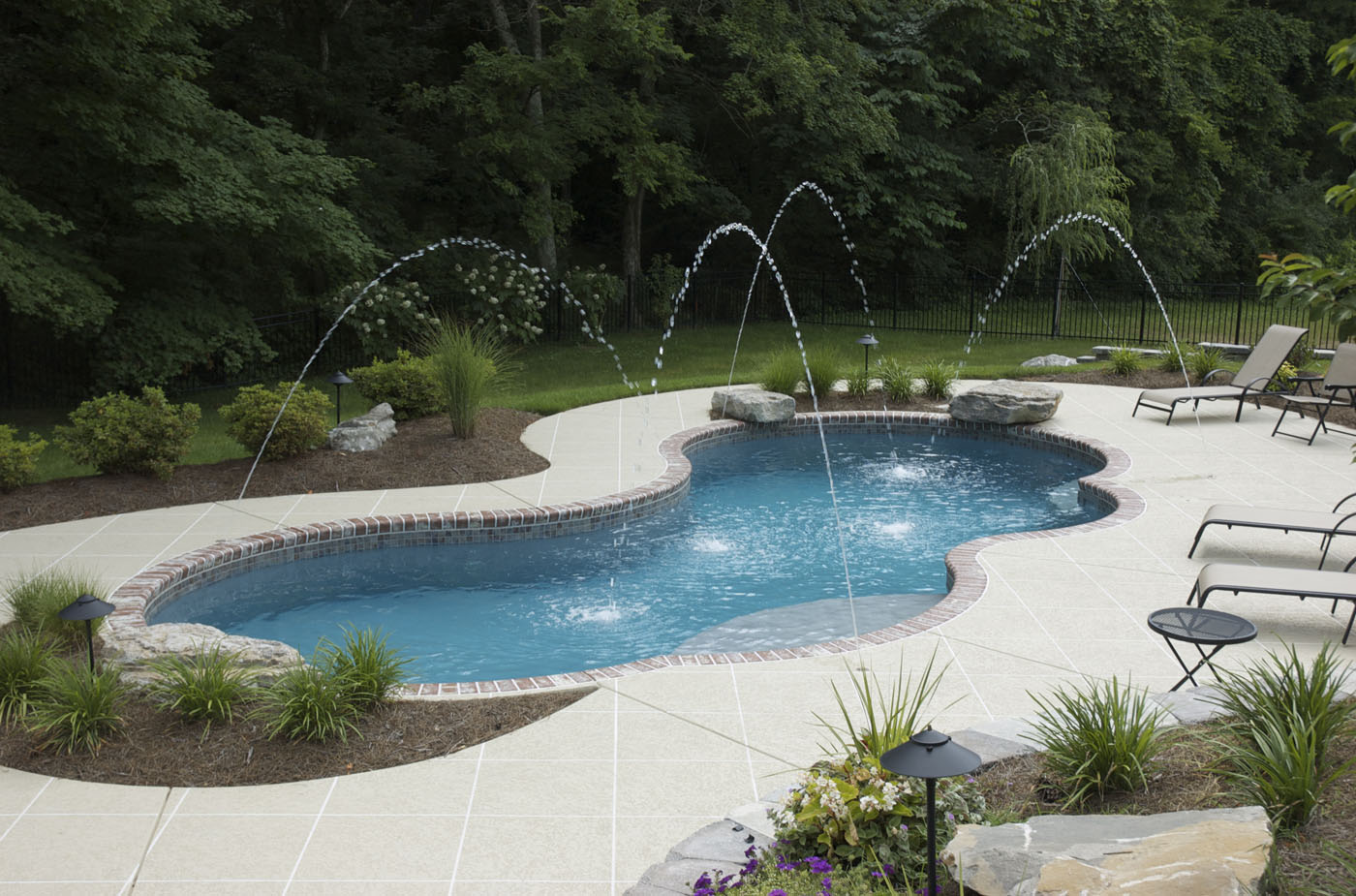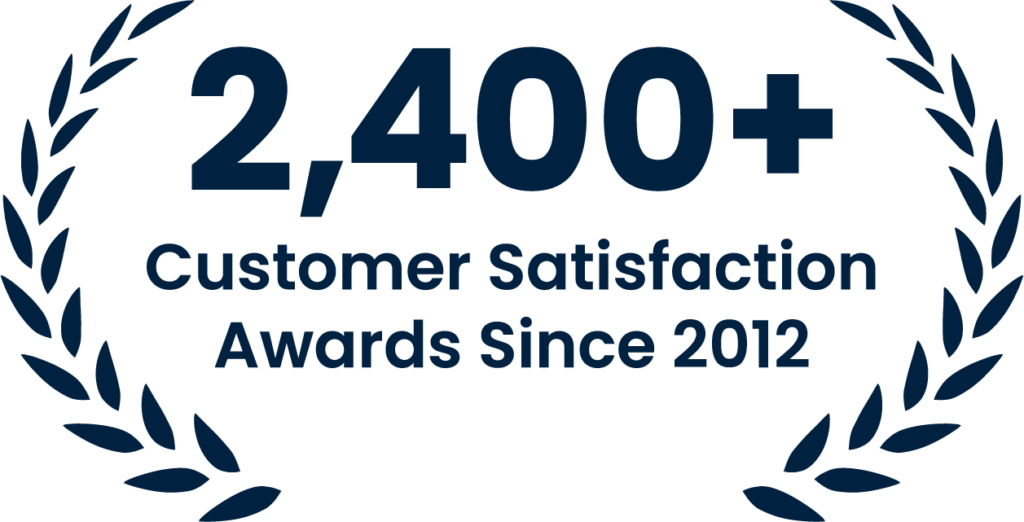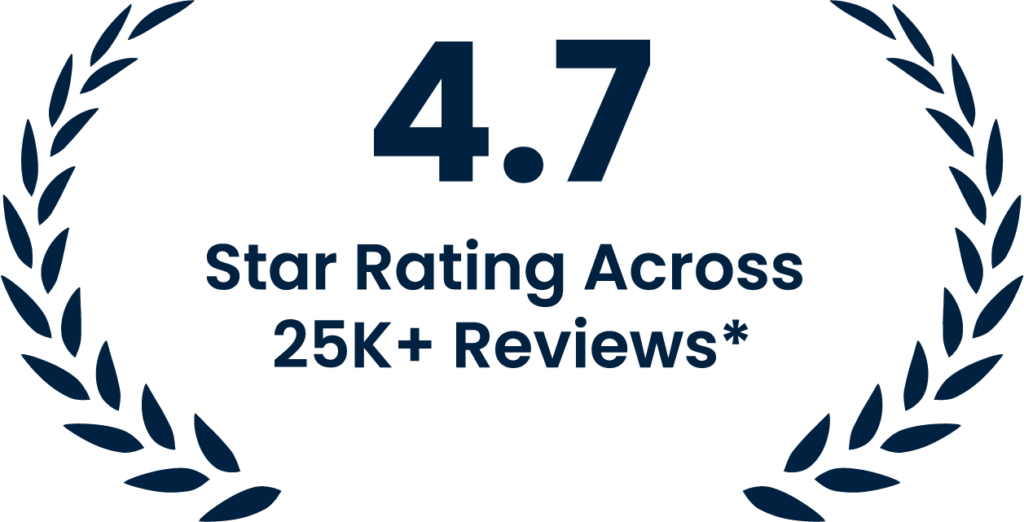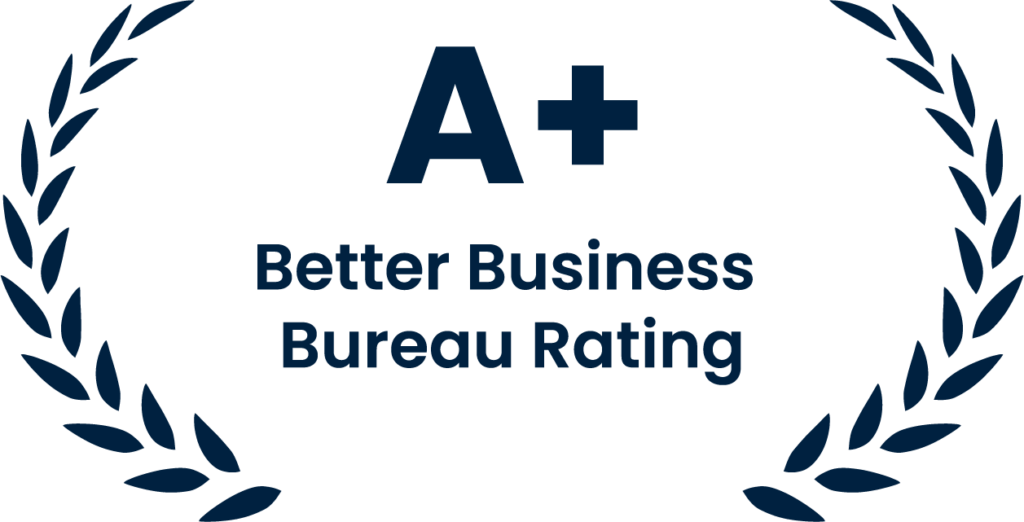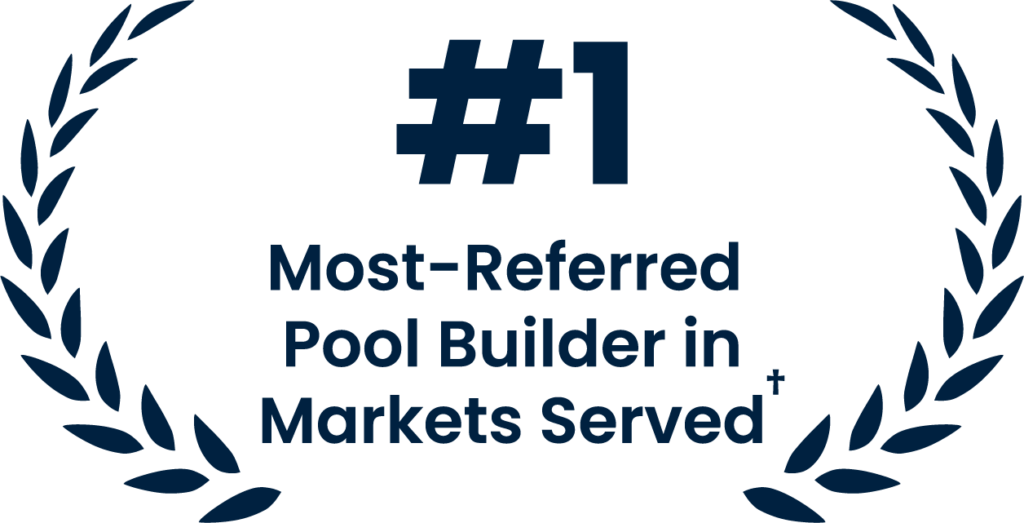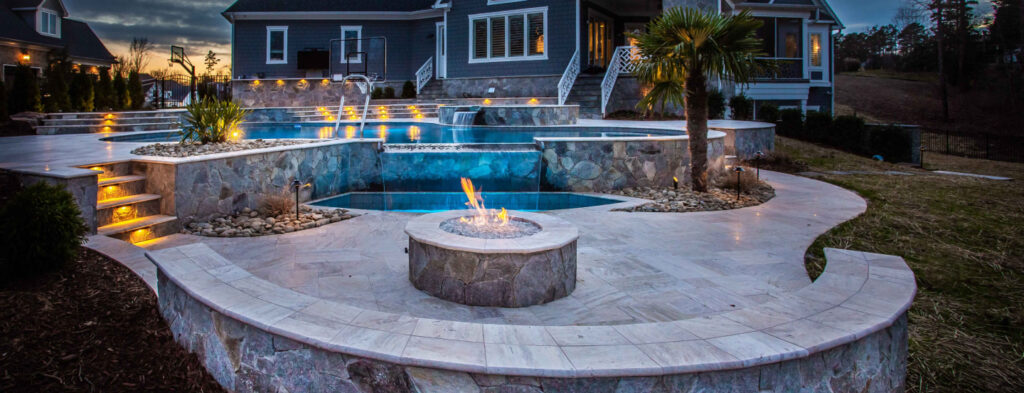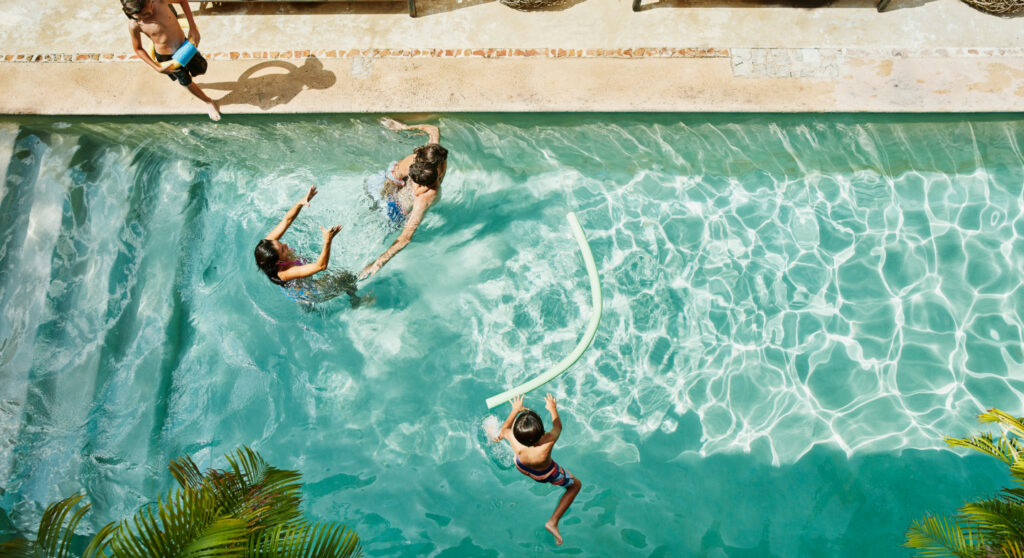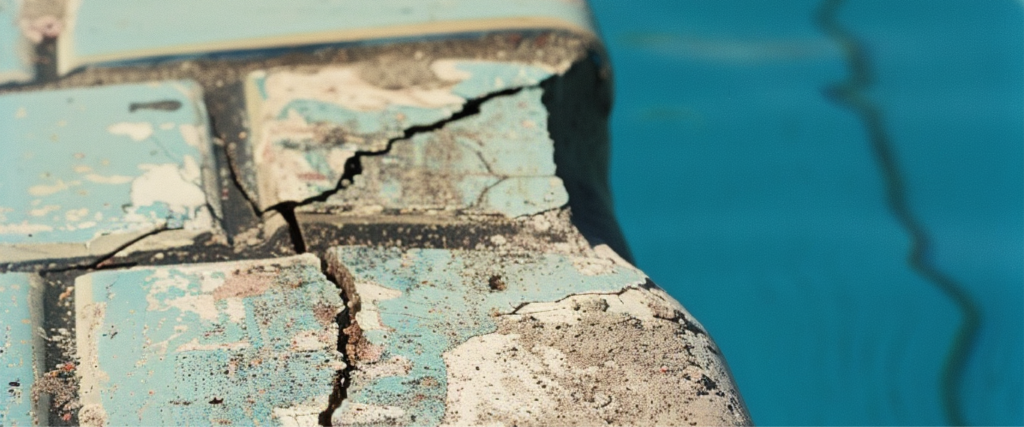To estimate how much an inground pool costs in Raleigh, NC consider the factors that affect installation and ongoing expenses.
1. Pool Material
When building an inground pool, the material you choose plays a major role in the overall cost. The three most common materials for pools are concrete, fiberglass, and vinyl. Each comes with its own advantages and disadvantages, so it’s important to consider not only initial construction costs but also long-term maintenance.
Concrete Pools
Concrete pools are the most customizable option, allowing you to create any shape, size, or depth you desire. This material is known for its durability and ability to last for 50-100 years with the right maintenance. Anthony & Sylvan will even offer a Lifetime Warranty as a testament to their durability. Concrete pools tend to have a higher initial construction cost due to the labor-intensive process of pouring the concrete and customizing the design. However, they offer the most value in the long run because they can be built exactly to your specifications.
Pros:
- Fully customizable in shape, size, and depth.
- Durable and long-lasting with proper care.
- Variety of finishes, such as plaster, pebble, or tile.
Cons:
- Potentially higher initial construction costs.
- May require resurfacing every 8-20 years.
Vinyl Pools
Vinyl pools are a more affordable option for those on a budget. The pool is built with a steel or polymer frame and a vinyl liner. While the initial costs are lower than concrete pools, vinyl pools do come with some significant downsides. The most notable issue is that the liner is more prone to wear and tear and typically needs to be replaced every 10 years, which can add substantial costs over time. Additionally, vinyl pools are limited in terms of customization compared to concrete pools.
Pros:
- Lower initial cost compared to concrete and fiberglass.
- Flexible in shape, but not as much as concrete pools.
Cons:
- Liner needs to be replaced every 10 years, adding to the total cost of ownership.
- Less durable than concrete or fiberglass; the liner can tear or get damaged.
- Limited design flexibility compared to concrete pools.
Fiberglass Pools
Fiberglass pools are a step up from vinyl pools in terms of durability and ease of maintenance, but they still fall short compared to concrete pools in terms of customization. Fiberglass pools come pre-molded in specific shapes, so you are limited to the designs available from manufacturers. Though the initial cost of fiberglass pools is typically lower than concrete pools, the lack of customization and the potential for repairs can make them a less appealing option for homeowners who want a fully personalized pool.
Pros:
- Low maintenance due to smooth, non-porous surfaces.
- Easy to install.
Cons:
- Limited design options due to pre-molded shapes.
- Expensive to repair if the pool is damaged.
2. Size and Shape
The size and shape of your inground pool are some of the most obvious factors that affect the cost of building it. Bigger pools need more materials, more labor, and more time to construct, so naturally, they’ll cost more. Custom shapes can also add to the price. While a simple rectangular pool is more straightforward and easier to build, something with curves or intricate details requires more work and expertise. If you’re looking to save some money, sticking with a standard shape may help keep costs down.
3. Leveling and Excavation
When building a pool in Raleigh, the cost of leveling and excavation can vary depending on the layout and soil type of your property. Raleigh’s common soil types, including Cecil sandy loam and Wake loamy sand, have different characteristics that affect excavation.
- Cecil sandy loam is easier to dig through, which can make site preparation more straightforward and less costly.
- In contrast, Wake loamy sand can be more challenging to work with due to its excessive drainage, requiring additional effort and equipment to properly excavate.
Additionally, if your yard has a slope or obstacles like trees or large rocks, more grading or removal work will be needed, which can increase costs.
4. Pool Add-ons and Features
In Raleigh, some of the most popular features for new pools include:
These features can truly elevate your pool experience, making it more enjoyable and customized to your needs. A heater, for example, is a great addition if you want to extend the swimming season beyond the hot summer months, allowing you to enjoy your pool well into the changing seasons of North Carolina. While they can increase the overall cost to build your new pool, they also provide a unique, luxurious touch that can enhance your backyard for years to come.
5. Utilities
It’s also important to consider utility costs when adding a new pool to your backyard. Pools require electricity for the pump and filtration system, and depending on the size and features of your pool, you may also need to account for heating costs if you plan to extend your swimming season past the Raleigh summers. Additionally, water usage will increase, especially when filling the pool initially and topping off the water levels throughout the year. These utility costs can vary depending on your pool’s size, equipment, and how often it’s used, so it’s a good idea to factor these into your long-term budget. As part of our service, Anthony & Sylvan Pools covers the cost of the initial water fill, helping you save on those first expenses. We also help you choose energy-efficient equipment to minimize ongoing utility costs and keep your pool operating efficiently.
6. Permits & Regulations
When building a new residential pool in Raleigh, there are several permits and regulations to consider, typically revolving around zoning, safety requirements, and proper installation of electrical and plumbing systems. These regulations are important to ensure your pool is built safely and complies with local codes. Since costs and requirements can vary significantly depending on the specifics of your property and project, it’s essential to consult with a local builder. At Anthony & Sylvan Pools, we handle all the necessary permits and regulations for you, taking the stress out of the process and ensuring everything is in compliance from start to finish.
7. Property Taxes
Adding an inground pool in Raleigh, NC, could raise your property’s appraised value, potentially increasing your property taxes. While there’s no specific property tax rate for pools in Raleigh, any increase in home value from the addition could impact your tax bill. It’s wise to consult a local tax professional for guidance.
8. Insurance
When you install a pool, it’s important to adjust your homeowner’s insurance to reflect the new addition. Although your premium may increase — usually around $50 annually — this is an essential step for protecting your investment. By updating your policy, you’ll have coverage for pool-related damages and liability in case of accidents or injuries on your property.
9. Pool Maintenance
Along with the initial construction expenses, regular maintenance is crucial to keep your pool in top shape. This involves tasks such as maintaining chemical levels, cleaning the pool, and vacuuming debris. For example:
| Type of Maintenance |
Frequency |
Average Cost |
| Cleaning and chemical balancing |
Weekly |
$80-150 per month |
| Drain and filter cleaning |
Every 3-6 months |
$60-125 per session |
| Opening/closing the pool |
Biannually |
$150-$300 per event |
Additional Maintenance Considerations by Pool Type:
-
- Concrete Pools: Resurfacing is recommended every 8 to 20 years to maintain a smooth surface and offset wear from constant water and chemical exposure.
- Fiberglass Pools: These may require occasional gel coat applications to address scratches or fading over time.
- Vinyl Pools: Liners typically need replacement every 10 years to maintain durability and appearance.
Winters in Raleigh also make proper pool winterization essential. This includes covering the pool and using winterizing chemicals, which can add to off-season maintenance costs.

